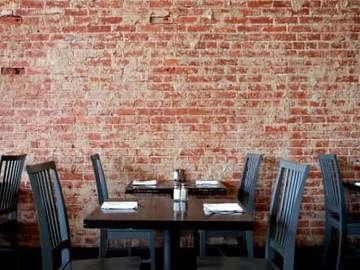Food is restorative, for sure. But restore isn’t the first word that we associate with eating—we tend to use words with meanings that are more specific, like nutritious or delicious. But although restore isn’t the first word that comes to mind when discussing food, restaurant is, and it comes from the same French word that gave us restore.

Hope you're hungry... for knowledge.
The French verb restaurer does mean “to restore,” though the meanings “to reestablish or return” and “to repair or bring back to good condition” are not as commonly used in French as they are in contemporary English. Restaurer does, however, have a meaning that the English restore does not: “to serve food to” or, as the reflexive verb se restaurer, “to eat.” This meaning dates back to the 12th century in French and evolved from the Latin verb restaurare. A noun developed by about 1500 from the present participle of restaurer, restaurant (“restoring”) that initially meant “a fortifying drink” or bouillon, or, more generally, “food or drink that gives strength.” Telling someone to “have a bit of restaurant” obviously sounds funny in English, but the meaning would have been closer to restorative, “something that restores strength.”
Although restaurant didn’t come to mean “restoring,” some English nouns have developed from French present participles used in this way, like savant (“knowing” became “one who knows”), occupant (“occupying” became “one who occupies”), remnant (“remaining” became “part that remains”) and tenant (“holding” became “one who holds”).
Restaurant began being used as a word meaning “a business where you can buy and eat a meal” in French in the 1760s. But because the essential meaning was “one who restores,” another form was also used for this then-new concept: restaurateur (“restorer”). The competing forms both entered English in the years around 1800 with the same meaning, and restaurateur meaning “restaurant” was still entered in Merriam-Webster’s Unabridged until 1961.
Ultimately, restaurant came to be the preferred term for the business and restaurateur came to mean “the owner or proprietor of a restaurant”—but notably continues to be spelled without the n, which can be confusing, since restaurant is far and away the more common word.
Just remember that you get nourishment from a restaurant, but you probably shouldn’t take a bite out of a restaurateur.
PS - Contradicting the title of this article, we do, as it happens, enter restauranteur as a less common variant form of restaurateur, and so you can always employ this spelling and point to our site should you feel like arguing with someone about this matter. Many people consider restauranteur a grievous error, and so you may wish to stick with restaurateur — life is too short and precious to waste it on arguing with people about this matter.




